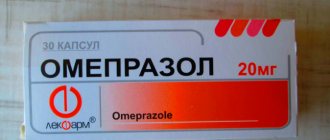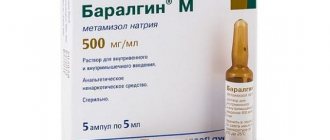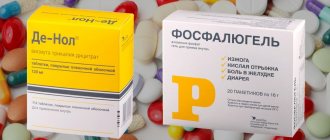Possible side effects
If treatment for gastritis is not started in time, an ulcer will form in the stomach over time.
However, not everyone is allowed to take Metronidazole. The components of the drug have good penetrating ability, so their concentration in internal organs, brain tissue, and biological fluids is high. Treatment of gastritis with Metronidazole is contraindicated if the patient has:
- pathologies of the nervous system;
- dysfunction of the liver and kidneys (especially in the stage of decompensation);
- dysfunction of the hematopoietic system or problems with blood.
It is not advisable for pregnant women and nursing mothers to take Metronidazole. When using the drug independently or changing its dosage, the following side effects may develop:
- disorders of the nervous system: headache, depression, increased irritability, sleep disturbances;
- changes in stool, bloating, nausea and vomiting;
- increased urge to go to the toilet;
- decreased libido in men and women.
Metronidazole should not be used if gastritis is detected in a child under 3 years of age. If the patient experiences symptoms of overdose or adverse reactions, it is necessary to immediately consult a doctor to decide whether further use of the antibiotic is appropriate.
Treatment methods
There are several forms and types of gastritis, each of which has its own characteristics. In order for the selected treatment regimen to be effective, an accurate diagnosis is required, which can be done using the FGDS procedure. Additionally, it is necessary to test for the presence of Helicobacter Pylori. If bacteria are found, treatment with antibiotics will follow.
In order to conduct a study for the presence of bacteria in the body, a biopsy of the mucous membranes is performed during FGDS. Pieces of tissue are sent for histological examination - and if Helicobacter Pylori is detected, gastritis has an infectious form. Less reliable are blood tests for Helicobacter Pylori and a breath test.
In addition to antibacterial drugs, the treatment regimen includes drugs to relieve swelling and inflammation of the mucous membranes. To do this, use proton pump blockers, for example, Omeprazole or antihistamines - Ranitidine or Famotidine. Only a doctor can tell how to treat the disease, since the results of the examination and the tests obtained play a big role.
The standard treatment regimen lasts seven or ten days. Medicines used:
- Metronidazole.
- Omez.
- Amoxicillin.
For a 7-day course of treatment, Metronidazole is used at a dose of 500 mg 2 times a day. For ten days - 200 mg 5 times a day. Seven-day treatment regimens include Amoxicillin. Dosage 1000 mg twice daily. The drug can be replaced with Clarithromycin, which is taken 250 mg 2 times a day. A ten-day treatment regimen may include Tetracycline. Use 250 mg 5 times a day.
Thus, the 7 and 10 day treatment regimen includes Metronidazole and the antibiotic Omeprazole. The choice of antibiotic is made by the attending physician. The dosage depends on the weight and age of the person, as well as the presence of concomitant diseases.
telemedicina.one
Use of the drug Trichopolum for the treatment of gastritis of the stomach
Gastritis or inflammation of the mucous membrane lining the inside of the stomach is one of the most common pathologies of the gastrointestinal tract. As studies have shown, one of the main causes of the development of the disease is a bacterium with the beautiful name Helicobacter pylori.
For this reason, antibiotics are the mainstay of treatment for the disease. Let's figure out in what cases Trichopolum is prescribed for gastritis and whether it is advisable to use this drug.
Description of the drug
Trichopolum is a popular drug with antiprotozoal and antibacterial activity. The active substance is metronidazole. Used in the treatment of certain parasitic and infectious diseases caused by microflora that are sensitive to it.
The use of Trichopolum in the treatment of gastritis makes sense provided that the bacterial nature of the disease is confirmed. If the examination does not reveal the presence of bacteria, then the use of antibiotics is not advisable.
Helicobacter pylori is highly resistant to antibacterial drugs, so two antibiotics and additional agents are prescribed simultaneously to treat the infection. Trichopolum is prescribed as one of the antibiotics as part of complex therapy. Additionally, the following drugs are used:
- Amoxicillin. A drug from the penicillin series.
- Clarithromycin. Belongs to the macrolide series.
- Erythromycin. Also a drug from the macrolide class.
- Tetracycline.
Operating principle
The active substance of the drug penetrates the cells of bacteria and protozoa, blocking the production of DNA in them, this leads to the death of microorganisms. At the same time, the substance does not have a negative effect on human tissue cells. The severity of the antimicrobial effect depends on the concentration of the active substance in the blood.
When taken orally, the drug is almost completely absorbed into the blood through the intestines. The maximum concentration develops within 1-2 hours after administration. The active substance is able to penetrate the placental and blood-brain barrier.
The active component is processed in the liver, most (up to 80%) is excreted in the urine, the rest through the intestines. With long-term use, it can accumulate in tissues.
Treatment regimen for gastritis
Treatment of gastritis with Trichopolum is advisable only in combination with an additional antibiotic and drugs to normalize the composition of gastric juice. Using Trichopolum for monotherapy does not make sense.
Advice! If metronidazole is used incorrectly, Helicobacter pylori bacteria become resistant to the antibiotic. Therefore, if therapy is ineffective, it must be replaced.
To treat gastritis of the stomach of an infectious nature, the following can be used:
- Quad therapy. The regimen includes four drugs - two antibiotics, one of which may be Trichopolum, as well as a bismuth-based drug (De-Nol) and a drug for normalizing the acidity of gastric juice (Omeprazole).
- Tritherapy. In this case, bismuth-based drugs are excluded from the regimen.
Advice! The gastroenterologist should choose a treatment regimen depending on test results and other indications.
How to take Trichopolum to treat gastric disease? The dosage of Trichopolum in the treatment of gastritis of the stomach is determined individually. Typically, one of two schemes is used:
- 500 mg twice a day for 7 days;
- 200 mg five times a day for 10 days.
Advice! In some cases, the course of taking the drug can be increased to two weeks.
Side effects
Trichopolum is usually well tolerated, but sometimes patients note the development of negative side effects. Most often, unpleasant consequences are associated with digestion, it is noted:
- nausea;
- loss of appetite;
- bowel disorders;
- intestinal colic;
- feeling of dry mouth.
Unpleasant symptoms from the central nervous system occur less frequently:
- disturbance of consciousness;
- loss of coordination;
- irritability;
- headaches and dizziness;
- sleep disorders.
If you are intolerant to the drug, allergic reactions may develop in the form of redness of the skin, the appearance of a rash, and also pain in the joints. When antibiotic therapy, one should take into account the fact that during the treatment, not only pathogenic microorganisms die, but also “good” bacteria that are part of the intestinal microflora.
This leads to the development of dysbiosis. To eliminate negative consequences, along with antibiotics, bifidobacteria and lactobacilli are often prescribed for preventive purposes. In addition, it is recommended to consume fermented milk products daily, which have a beneficial effect on the intestinal microflora.
special instructions
Ulcerative gastritis is a serious pathology that is difficult to treat. Metronidazole is most often used for this purpose, but this medicine is an antibiotic, and therefore has special instructions for use:
- After taking the pill, you should not drive a car for the next few hours, as side effects such as dizziness, clouding of consciousness, and slow psychomotor functions are possible;
- If the functionality of the liver and kidneys is impaired, treatment of gastritis requires adjustment of the dosage of Metronidazole;
- If it is necessary to use the drug with indirect anticoagulants, you need to carefully review the contraindications and establish the rate of administration of the anticoagulant;
- When taking the medicine simultaneously with antacids, its absorption by the gastric mucosa slows down.
During treatment of gastritis with Metronidazole, it is necessary to constantly monitor the level of leukocytes in the blood. If there are any abnormalities in the composition of the blood, then the question of discontinuing the drug and using its analogue is raised.
It is prohibited to use Metronidazole on your own, since uncontrolled use of tablets and non-compliance with the regimen of use will lead to a deterioration in the patient’s well-being and further development of gastritis.
Found a mistake? Select it and press Ctrl Enter
Home » Treatment of gastritis » Metronidazole for gastritis and ulcers - instructions
Metronidazole is the first active substance that was once used to destroy the pathogenic bacteria helicobacter pylori for gastritis, gastroduodenitis and gastric ulcers.
The drug of the same name is actively used in anti-Helicobacter therapy to this day.
This medicine belongs to the group of antimicrobial and antiprotozoal agents and is a synthetic broad-spectrum antibiotic.
Metronidazole helps not only with HP-associated inflammation of the stomach, but also with giardiasis, trichominiasis, peritonitis, and pneumonia.
We suggest you read: Can there be blood with constipation?
Found a mistake? Select it and press Ctrl Enter
pillsman.org
Peculiarities
Is it possible to take Trichopolum for gastritis? The peculiarities of treating the disease with this medicine are that it is antibacterial and antiprotozoal. The drug is prescribed only in combination to eradicate the bacterium Helicobacter pylori. "Trichopol" is not used without drugs that reduce stomach acidity. It should not be prescribed for the treatment of stomach and duodenal ulcers. The tablets are quickly absorbed in the intestines and reach their highest concentration within three hours after administration and are evenly distributed in the body. Completely excreted by the kidneys and liver after eight hours.
While taking Trichopolum, the patient's urine turns dark brown due to the presence of dyes in the composition. If the drug is used simultaneously with lithium preparations, it is necessary to monitor the level of the substance in the blood. Its excess leads to intoxication of the body. Trichopolum can enhance the side effects of some medications. It is dangerous to take it simultaneously with the active substances astemizole, terfenadine, disulfiram. Side effects include nausea, vomiting, ataxia, and convulsions.
Choice of antibiotics
Antibiotics for gastritis, their dosage and duration of treatment must be prescribed by a doctor. Self-medication and uncontrolled use of medications can cause stomach ulcers and other complications. The treatment regimen most often includes the following drugs:
- Clarithromycin.
- Amoxicillin.
- Metronidazole.
- Omeprazole.
The first treatment regimen was created by Barry James Marshall and was based on the positive properties of the antibacterial drug Metronidazole. The antibiotic made it possible to completely eliminate pathogenic bacteria and cure gastritis. At the moment, it is also used in therapy, but not so actively. It is believed that Helicobacter Pylori very quickly develops resistance to it.
Clarithromycin is a broad-spectrum antibiotic that only rarely causes unpleasant side effects. Available in the form of tablets, solution and suspension. The drug in tablet form should be prescribed strictly by the attending physician, as it is not suitable for everyone. Most often, a suspension is used for gastritis.
Amoxicillin is prescribed in combination with Metronidazole. This antibiotic has increased resistance to acids, which makes it effective for treating gastritis. Amoxicillin Metronidazole is the most popular treatment regimen for gastritis. Almost always, treatment regimens for gastritis include Metronidazole.
Many patients do not understand why they need to take two antibiotics at once. The thing is that pathogenic bacteria quickly get used to antibacterial drugs and their effectiveness is reduced to zero.
If gastritis is not caused by Helicobacter, then taking antibiotics does not make sense. This will only negatively affect the mucous membranes and aggravate the disease. Medicines should be prescribed by a gastroenterologist. Without test results, based only on symptoms, antibiotics for gastritis are not prescribed.
Instructions for use of metronidazole
The tablets are white, with a yellowish-greenish tint, flat-cylindrical; there is a transverse stripe.
In addition to the key component, the composition includes povidone, stearic acid and potato starch.
The components of the drug disrupt protein synthesis in the cells of pathogenic microorganisms and interfere with tissue respiration of bacteria.
The active substances are involved in metabolic processes and are metabolized in the liver, and then very slowly removed from the body.
Excretion is carried out mainly in urine (up to 80%) and to a lesser extent in feces.
How to take metronidazole - before or after meals?
The drug is usually taken after or during meals. The tablet is not chewed.
Dose for adults: 2 tablets three times a day.
How many days should I take the drug?
The course of anti-Helicobacter therapy usually lasts 7 days. Often it is combined - that is, at the same time the patient is asked to take other pills (for example, amoxicillin, amosin).
Metronidazole analogues
Features of the use of Metronidazole in the treatment of gastritis
The main active ingredient of the antibiotic is Metronidazole. It was this drug that was the first to be used in the treatment of all forms of gastritis caused by Helicobacter pylori infection. And it has proven its effectiveness, remaining today the most popular means of antibacterial therapy.
Metronidazole belongs to a group of antiprotozoal/antimicrobial drugs used in the form of suppositories, infusion solutions, tablets and mixtures. Typically, for gastritis, this antibiotic is prescribed in the form of orally taken white tablets with a light light green tint. In addition to metronidazole itself, the medication contains povidone (a local antiseptic), stearic acid and vegetable starch.
How to take Metronidazole for gastritis is decided only by a gastroenterologist: the drug is characterized by a fairly large list of contraindications, so when determining a treatment regimen, it is necessary to take into account a number of factors:
- whether the patient has undergone kidney dialysis in the foreseeable past;
- whether he abuses alcohol;
- whether the patient has a history of renal pathologies;
- porphyrin disease is also a direct contraindication to the use of metronidazole;
- The drug is also prescribed to pregnant and breastfeeding mothers with great caution.
Metronidazole is the main active substance in a number of analogues of the drug (Ornidazole, Tinidazole, Secnidazole, Trichopolum), the composition of which differs in auxiliary components. They are prescribed taking into account the possible presence of allergic reactions to any components of these antibiotics.
The principle of action of Metronidazole is to block the respiratory abilities of pathogenic bacteria, as well as to disrupt the mechanism of protein synthesis of Helicobacter. After taking the drug, they actively participate in metabolic processes, affecting H. pillory in the digestive tract, after which they enter the liver, where the active substance is metabolized. 20% of it is excreted in feces, 80% in urine.
Causes
https://www.youtube.com/watch?v=_y235lM8asA
Doctors often prescribe Trichopolum for gastritis. The product is proven, inexpensive and actively used in the fight against the disease. Doctors list the main causes of acute gastritis as:
- Eating poor quality food, eating foods contaminated with pathogenic bacteria.
- Infections that enter the stomach with Helicobacter pylori, which causes increased acidity.
- Ingestion of toxic substances into the stomach.
- Drinking strong alcohol.
- Taking nonsteroidal medications.
- Dysbacteriosis.
- Impaired metabolism.
The causes of chronic gastritis are:
- Infections.
- Infection of the body with parasites.
- Unbalanced diet.
- Eating junk food, too spicy, fatty, hot.
- Alcoholism.
- Bad habits (smoking).
- Stress, neurosis, depression.
- Helminthic infestations.
- Uncontrolled use of medications.
- Stomach operations.
- Endocrine disorders.
- Heredity.
- Chronic diseases.
What antibiotics are usually prescribed for gastritis?
The harmful bacterium that causes gastritis has a favorite habitat - the gastric mucosa.
The list of antibiotics may include 4 groups of basic drugs, each of which has a specific basis:
- Clarithromycin (Klacid SR, Binoclair, Clarexid).
- Omeprazole (Omefez, Promez, Omez).
- Amoxicillin (Amoxil, Amoxiclav, Amoxicar).
- Nitroimidazole (Metronidazole, Ornidazole).
The beginning of such therapy was laid by Barry Marshall, who participated in the discovery of the bacterium Helicobacter pylori and proved the high effectiveness of taking the antibiotic Metronidazole. It was with its help that it was possible to achieve complete destruction of the bacterium (eradication). Currently, this can be achieved by using multiple antibiotics in the right combination.
Metronidazole
The historically proven effect, tested by Barry Marshall himself, unfortunately, has lost its enormous popularity in the treatment of gastritis and ulcers due to the increase in bacterial resistance to the drug. Studies have proven this resistance; 60% of patients showed resistance to the drug metronidazole, which is a significant indicator not in its favor. Therefore, the drug is combined with the antibiotic Amoxicillin.
One of the most popular means used as a weapon against Helicobacter pylori. This antibiotic has an impressive spectrum of action, which is often supported by antisecretory drugs to speed up and increase the efficiency of cleansing the body of bacteria. By the way, Clarithromycin (Klacid SR) causes almost no side effects in 98% of patients. Klacid is available in several versions:
- Klacid and Klacid SR in tablet form.
- Klacid in powder form for preparing a suspension.
- Klacid in the form of a soluble substance for the preparation of a solution for infusion.
The release form determines the main characteristics of the drug. Thus, Klacid SR tablets have a prolonged action, and Klacid are immediate-release tablets. The advantage of Klacid SR is its long-term effect, including on Helicobacter.
Amoxicillin
Amoxicillin is an antibiotic with increased acid resistance. This is a semi-synthetic drug with a pronounced bactericidal effect. The spectrum of action of the antibiotic Amoxicillin is quite wide; sensitivity to it is manifested by many bacteria.
We suggest that you familiarize yourself with Metronidazole against parasites in the human body
Taking the drug "Trichopol", dosage features for gastritis
Recently, a huge variety of medicines have been found that help effectively relieve pain due to gastritis. A medicine such as Trichopolum is prescribed quite rarely for gastritis. As a rule, its use is resorted to only when the disease is caused by the bacterium Helicobacter pylori. Trichopolum" is a synthetic antibacterial drug; as practice shows, it should be taken together with other drugs.
Only complex therapy helps to achieve effective lasting results. True, the use of Trichopolum should be abandoned during eradication. It will be better if the product is used together with tablets that help reduce stomach acidity. If other causes are identified that affect the inflammation of the gastric mucosa, gastritis, as a rule, is treated not with Trichopolum, but with other medications that have an atypical composition.
Composition of the drug
The predominant component of Trichopolum is metronidazole. It was this active substance that was chosen by the Maastricht Treaty, becoming one of the most effective antibiotics with which Helicobacter pylori can be eradicated. True, Russians, who resort to self-medication more often than citizens of other countries, use metronidazole for the wrong purposes when it is needed. It was this fact that influenced the fact that the body’s resistance to the remedy of a resident of Russia is several times higher than that of a person living in Europe.
In fact, it is this fact that increasingly determines the doctor’s refusal to prescribe Trichopolum for gastritis; if the patient presents with the corresponding symptoms, he is usually prescribed other medications. The methods of therapeutic effects on the human body developed by Russian doctors usually come down to the use of Nifuratel. "Trichopol" can be prescribed to a patient only if treatment according to the first line developed does not bring the desired result. In addition, Trichopolum is used if it is necessary to adjust the method of treatment or replace it.
Those who are interested in how to take Trichopolum for gastritis should not only read the instructions, but also visit their doctor. Usually this medicine is taken three times a day, 500 mg. As a rule, the course of treatment lasts for two weeks.
Dosage form
A drug such as Trichopolum may have several dosage forms. As a rule, you can purchase oral tablets that contain 250 mg. active substance or tablets for vaginal use, their composition contains metronidazole up to 500 mg. If necessary, on the recommendation of a doctor, you can use a solution for infusion; it is sold in ampoules of 20 ml. Each of them contains 100 mg. active remedy.
As a rule, Trichopolum is able to cure infections such as trichomoniasis, giardiasis, and amebiasis. At the same time, this drug helps get rid of liver abscess, peritonitis, endometritis, pneumonia, sepsis, and endocarditis.
Who should stop using Trichopolum?
If a patient decides to take Trichopolum for the treatment of gastritis, he should first familiarize himself with a number of existing contraindications. As a rule, anyone who suffers from pathologies such as blood disease, poor coordination, or liver failure should avoid using the drug. Naturally, anyone who has diseases of the nervous system and is sensitive to metronidazole should not take the medicine.
If a pregnant woman consults a doctor and needs to take Trichopolum in order to reduce the manifestations of gastritis, the drug must be used with extreme caution. It is extremely important to avoid its use during the first trimester. Subsequently, the doctor needs to compare the percentage of benefits and risks for the unborn child. Studies show that metronidazole is able to be absorbed into the placenta. When the drug is consumed by the mother of the baby, metronidazole passes to the baby through mother's milk, producing a bitter taste. During lactation it is better to avoid taking this medication. In the event that treatment is carried out exclusively with tablets, breastfeeding will have to be abandoned, giving the child breast milk only two days after the full course of treatment has been completed.
Conclusion
"Trichopol" is used for gastritis quite rarely, which is due to the resistance of the Russian body to metronidazole. Just like other medications, the drug has a number of specific contraindications and side effects. In any case, you must visit a doctor before using the drug. Today, Trichopolum produces, which is located in Poland.
pobedigastrit.ru
Symptoms
Is it possible to take Trichopolum for gastritis? This is one of the drugs that is prescribed by your doctor if you have certain symptoms. You should not self-medicate if you discover the presence of a number of typical symptoms characteristic of gastritis:
- Constant nausea.
- Vomit.
- Lack of appetite.
- Pain in the upper abdomen that is sharp or burning. It goes away or gets worse when eating.
- Bloating.
- Feeling of fullness in the stomach after eating.
- Unpleasant taste in the mouth.
- General weakness, irritability.
- There is a yellow or white coating on the tongue.
- Dramatic weight loss.
- Fever.
- Heart problems, low blood pressure.
- Drowsiness or insomnia.
If gastritis is treated incorrectly or if you hesitate to see a doctor, it can cause serious complications. Among them are internal bleeding, sepsis, anemia, pancreatitis, dehydration, anorexia, ulcers, and stomach cancer. That is why many doctors recommend Trichopolum and other drugs that need to be taken in combination for gastritis.
Contraindications
Each patient situation requires the development of a treatment strategy, but there are cases when established rules work and eradication therapy is prescribed without fail:
- Gastric and duodenal ulcers
- Genetic predisposition to cancerous tumors in this area
- Atrophic gastritis (precancerous condition)
- Functional dyspepsia
Antibiotics for gastritis are a cardinal, but necessary measure in the treatment process. Many variations have been developed, such as the aforementioned Amoxicillin and Metronidazole.
There are quite a lot of treatment regimens; if one of them does not work, then the next one is prescribed. Inflammation of the gastric mucosa can be the starting point for the development of other diseases. If characteristic symptoms and pain in the stomach appear, do not hesitate to contact a specialist!
The high penetrating ability of Metronidazole allows the active substance to quickly distribute in saliva, urine, and breast milk. The placental barrier is not an obstacle for it, and it also easily penetrates the brain. During pregnancy and lactation, treatment with the drug is contraindicated.
A gastroenterologist will never prescribe treatment with the drug in the following cases:
- For blood diseases.
- In case of renal or liver failure.
- With lesions of the central nervous system.
Only a doctor can use test results to determine the risks that may arise when taking the drug. It is important to understand that Metronidazole is a potent antibiotic.
When carrying out treatment with the drug, you must stop drinking alcohol. If you do not comply with the requirement, this can lead to unpredictable consequences, including serious and irreversible changes in the liver tissue.
In the treatment of bacterial gastritis, Metronidazole is considered the most effective remedy. The medicine acts on pathogenic bacteria very quickly, killing them.
Therefore, due to the use of the drug against the background of restorative therapy, gastritis can be permanently cured. In severe cases, this antibiotic is used in complex treatment in combination with other antibacterial agents.
Many patients are interested in: “Trichopol” treats gastritis or not? The drug is used if the cause of the disease is the bacterium Helicobacter pylori, various infections, and the treatment regimen prescribed by the doctor does not help. You should not take Trichopolum if the patient has blood diseases, impaired coordination of movements, is diagnosed with liver failure, or central nervous system diseases.
Individual intolerance to the active substance is an absolute contraindication for use. If gastritis appears during pregnancy, you need to treat the disease with Trichopolum very carefully. In the first trimester, its use is prohibited. In the second, you can take the medicine if the benefits to the woman outweigh the risks to the fetus. The medicine quickly penetrates the placenta and is excreted into milk, so it should not be used during lactation.
Indications for mandatory use
Each patient situation requires the development of a treatment strategy, but there are cases when established rules work and eradication therapy is prescribed without fail:
- Gastric and duodenal ulcers
- Genetic predisposition to cancerous tumors in this area
- Atrophic gastritis (precancerous condition)
- Functional dyspepsia
We suggest you read: Is it possible to remove moles during pregnancy?
Antibiotics for gastritis are a cardinal, but necessary measure in the treatment process. Many variations have been developed, such as the aforementioned Amoxicillin and Metronidazole.
There are quite a lot of treatment regimens; if one of them does not work, then the next one is prescribed. Inflammation of the gastric mucosa can be the starting point for the development of other diseases. If characteristic symptoms and pain in the stomach appear, do not hesitate to contact a specialist!
How to treat
Before prescribing treatment, it is necessary to determine the type of gastritis: acute or chronic. If the disease occurs as a result of poisoning, it is necessary to begin therapy with gastric lavage. The patient is recommended to diet and take antispasmodics. Gastritis can be purulent, chemical, catarrhal, bacterial. Special methods of therapy are used for each. The only thing that remains is to follow a gentle diet.
For the treatment of chronic erosive gastritis, Trichopolum is one of the few drugs that effectively and quickly cope with the disease. It not only eliminates the symptoms, but also fights the cause, that is, it destroys bacteria and harmful microorganisms. Therapy for the chronic form includes taking medications, eliminating the cause of the disease, following a diet, and spa treatment.
We suggest you familiarize yourself with Itching in the anus after stool
Treatment of gastritis with folk remedies is also possible. Medications are prescribed by the doctor taking into account the acidity of the stomach. If it is elevated, it is advisable to take adsorbent, enveloping, antacid agents. If the acidity level is low, drugs are recommended that enhance the secretory function of the stomach.
Getting rid of stomach pain due to gastritis: medicines and folk remedies
The most common gastrointestinal ailment in our time is gastritis, which causes inflammation of the gastric mucosa. As a result, the organ ceases to effectively perform its functions.
The main symptom of a serious disease is the appearance of pain, which manifests itself sharply and can be cramping. This symptomatology makes the patient feel discomfort.
After the diagnosis, the attending physician prescribes complex therapy, which includes medication and a special diet.
Self-administration of painkillers is prohibited.
Gastritis without pain is rarely observed. So, during a disease that is accompanied by high acidity, the solar plexus area hurts. And during low acidity, most often the patient suffers from pain after meals.
Elimination of symptoms
What drugs are used?
Antibiotics for gastritis are never used independently without concomitant therapy. Only comprehensive treatment helps eliminate Helicobacter and the symptoms of the disease. Multicomponent treatment aimed at eliminating Helicobacter is called eradication therapy.
Deviations from the protocol regarding the use of products that combat high acidity are allowed, since the market for products is constantly expanding. However, changing the standard of antibacterial therapy is not recommended, since antibiotics not included in the protocol have a much lesser effect on bacteria.
Antibacterial drugs included in the protocol for the treatment of diseases of the gastrointestinal tract are presented below:
- Amoxicillin.
- Tetracycline.
- Clarithromycin.
- Metronidazole.
All anti-Helicobacter drugs are prescribed for a course of seven or ten days. Deviations from the course duration are not allowed. All regimens contain Metronidazole.
Description of the drug
Doctors sometimes prescribe Trichopolum for gastritis if the disease is bacterial. The drug is not modern, but is still used. “Trichopol” is a synthetic antibacterial agent that is included in the complex therapy of gastritis. It is appropriate to use together with tablets that reduce stomach acidity.
The drug is considered universal, as it is used for bacterial infections, vaginitis, urethritis, peritonitis, abdominal abscess, after surgery, to prevent complications. “Trichopol” destroys the cellular structure of Giardia, dangerous bacteria that affect the human liver and intestines.
Features of the drug's action
Metronidazole is one of the first antiprotozoal and antibacterial agents that was used to destroy Helicobacter and treat gastritis. Despite the fact that microorganisms are becoming more resistant to the effects of the antibiotic every year, it is still used in therapeutic regimens.
Most often, the drug is prescribed to patients in the form of tablets. They are white with a slight green tint. Before prescribing Metronidazole, the doctor must find out how the person eats and what additional medications he takes.
The main active component quickly penetrates the bacteria and destroys its DNA. Pathogenic microorganisms cannot grow and multiply further. The doctor determines exactly how to take Metronidazole for gastritis, based on laboratory tests, possible contraindications, and the severity of the disease. Other drugs are used in conjunction with this drug to enhance its effect.
Diet during therapy
Treatment of chronic gastritis is necessarily accompanied by diet. It is especially relevant, since the patient will take 17 tablets per day under some regimens, of which 10 will be antibiotics. Be sure to have five full meals a day.
The diet should include boiled dishes and cereals. Boiled and stewed poultry, eggs, bananas, and dairy products are recommended. Spicy, fried, sour and other foods that irritate the stomach are completely excluded. It is undesirable to consume sausages and sharp cheeses. Sweets can not be completely excluded, but limited, as they worsen digestion.
Alcohol is completely unacceptable, since together with Metronidazole, even a small dose can cause severe cardiovascular and respiratory disorders, including the development of life-threatening situations.
Thus, the complex treatment of chronic gastritis includes several antibiotics in large doses. A properly selected treatment regimen will completely protect the body from dangerous bacteria. High-quality nutrition and mandatory observation by a gastroenterologist help fight infection.
How to use
One Trichopolum tablet contains 250 mg of metronidazole (active substance), potato starch, magnesium stearate, gelatin, and starch syrup. How to take Trichopolum for gastritis? The most common regimens include taking the drug 250 mg four times a day or 500 mg twice a day during and after meals.
The maximum period of treatment is fourteen days. Patients diagnosed with liver or kidney failure require an individually selected treatment regimen. High concentrations of the active substance in the liver can lead to coma. In elderly patients, the dose of metronidazole should be reduced.
During treatment with the drug, you should not drink alcohol. After taking Trichopolum, candidiasis of the digestive tract sometimes develops. In this case, the doctor prescribes antifungal agents. The medicine causes weakness, dizziness, psychomotor reactions decrease, confusion occurs, and convulsions appear.
Treatment of gastritis with Metronidazole is based on the fact that the active substance not only stops protein synthesis in the cells of pathogenic bacteria, but also disrupts their tissue respiration. After taking the drug, the active substance actively participates in metabolic processes. This allows you to effectively influence harmful bacteria, gradually destroying them.
Many people are interested in how to take Metronidazole tablets? It is recommended to consume them without chewing, drinking plenty of water. This should be done immediately after eating or during a meal.
If you know how to take the drug correctly, you can enhance its positive effect in the treatment of gastritis. Treatment regimens may vary, but the traditional course is to take 6 tablets per day. You need to take two tablets three times a day.
It is important to remember that taking Metronidazole to treat gastritis can only be done to destroy the pathogenic bacteria Helicobacter pylori. Treatment of the disease must be carried out under the supervision of a doctor. This will allow you to make timely adjustments if necessary.
Features of application
For erosive gastritis, Metronidazole should be taken three times a day during or after meals. The maximum daily dose is 6 tablets. You can't chew them. They are swallowed whole and washed down with water (large quantities). The maximum duration of the therapeutic course is 7 days.
Helicobacter is an insidious bacterium, as it quickly loses sensitivity to antibiotics. Therefore, even a mild form of gastritis is difficult to treat. To cope with the disease, Metronidazole is used in conjunction with other drugs: Amoxicillin. This scheme is used only if the test for the presence of pathogenic microflora in the stomach is positive.
The dosage of the drug is calculated by the doctor. The standard treatment regimen for gastritis with Metronidazole involves taking the drug twice a day, 500 mg .









